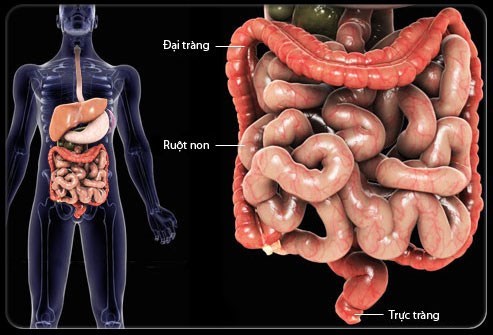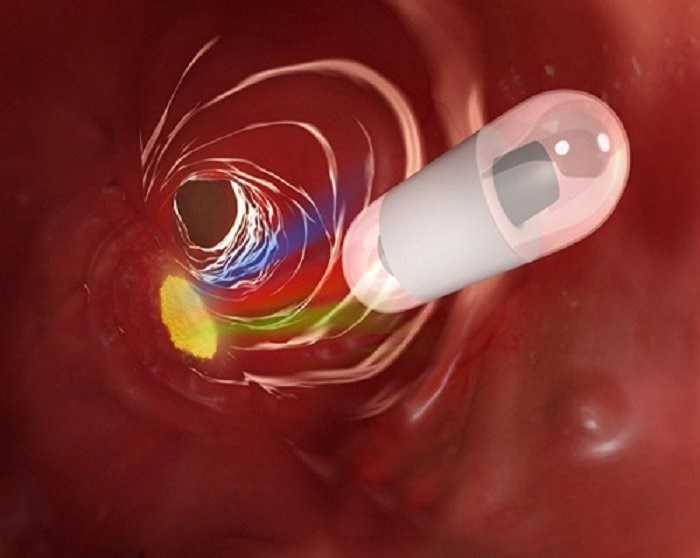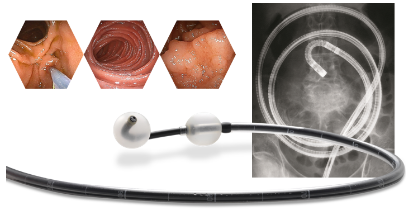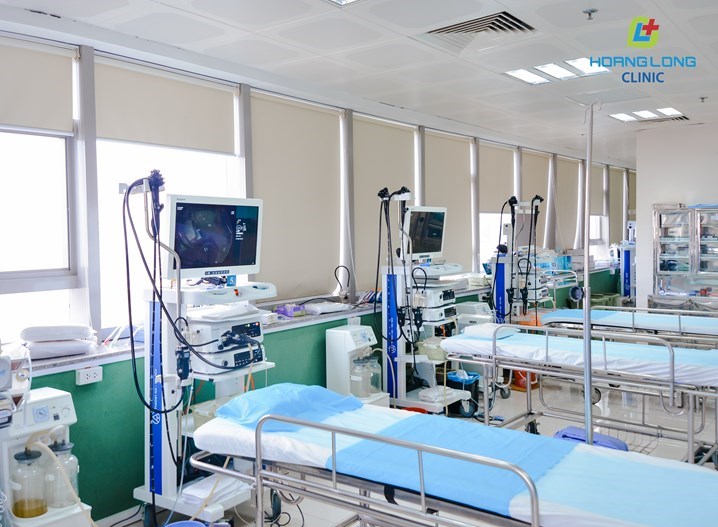The small intestine (or small bowel) is the longest and hardest-to-reach part of the digestive tract. Therefore, there are not many methods of small bowel exploration. The following article will help you choose the most appropriate method for you!
What is the small intestine, and how does small bowel endoscopy work?
The small intestine is a part of the digestive system, with an average length of 5 - 9m, connecting the large intestine and the stomach. According to studies, diseases related to the small intestine include the manifestation of tumors, small bowel inflammation, small bowel cancer, etc.
Small-bowel endoscopy is the most effective exploration method to examine and detect lesions in the small intestine. It can also evaluate the function of the small intestine and screen for malignancies.
Read more: What is the small intestine, and what is its role in the digestive system?

Image: What is the small intestine, and how does small bowel endoscopy work?
Current methods of small bowel endoscopy
Currently, many different endoscopic techniques are applied to the small intestine. The most common are capsule endoscopy, single balloon endoscopy, and especially double-balloon endoscopy.
Capsule endoscopy
This procedure is a non-invasive diagnostic method. A patient will swallow an endoscopic capsule integrated with a tiny camera 11mm x 24mm capable of recording three frames per second for 11 hours.

Image: Capsule endoscopy
The images will be recorded by a wireless device that the patient swallow before the procedure. The doctor will make the diagnosis based on those images. Capsule endoscopy can detect lesions and bleeding sites and monitor tumors' status in the small intestine. Then the capsule will be evacuated by defecation.
However, there are some limitations. This method cannot detect lesions if the small intestine is not clean or the lesions are in blind spots. This technique also cannot perform interventions when lesions are detected. In addition, the device may malfunction during the procedure because of a dead battery or technical failure. The capsule can also be trapped because of large tumors or narrow parts of the small intestine.
Single-balloon endoscopy
Single-balloon endoscopy is an improved small-bowel endoscopy technique using an oral approach that allows better observation of the small intestine. This technique can also be done bottom-up through the colon to observe the terminal ileum. Single-balloon endoscopy provides easier visualization of the small bowel than conventional endoscopy. However, single-balloon endoscopy is relatively complicated, making doctors challenging to perform this technique.
Double-balloon endoscopy
This method is considered the most modern. This method has many applications, such as:

Illustrations: Double-balloon endoscopy
- Further observation of the small intestine so the doctor can examine the small intestine easier
- Taking biopsies of lesions in the small intestine
- Making diagnoses or performing interventions on lesions that narrow the small intestine
- Detecting and evaluating small bowel tumors
- Taking foreign bodies in the small intestine
- Detecting the causes of intestinal obstruction
- Performing complete colonoscopy in challenging cases.
Small bowel endoscopy is an effective method for examining and assessing small bowel lesions and screening for related diseases.
Where is the best place for small bowel endoscopy?
Hoang Long Clinic has invested in Fujifilm's most modern double-balloon endoscopy system. This endoscopy system helps the doctor examine the small intestine and perform necessary interventions (polyp resection, coagulation, taking biopsy...).

Image: Where is the best place for small bowel endoscopy?
In addition, the clinic is equipped with modern endoscopy systems of Fujifilm. They include the Lasereo and the 7000 system, which can magnify up to 300 times. These systems can detect even the most minor lesions that conventional endoscopy techniques cannot do.
Hoang Long's doctors are experts in gastrointestinal diseases, with many years of experience working at major hospitals such as Bach Mai Hospital, Hanoi Medical University Hospital, E Hospital...
The clinic also provides anesthesia endoscopy services to help patients who cannot withstand or have contraindication with conventional endoscopy. Anesthesia endoscopy is painless, relatively safe, and does not affect health, which has become the choice of many patients when having an endoscopy.
With an appointment booking system on the clinic's website, Facebook fanpage, and hotline, you can actively choose the date and time according to your schedule. The medical staff of Hoang Long Clinic will answer all questions and provide all the necessary information and detailed instructions on what to prepare before the endoscopy.
Therefore, you can rest assured when visiting and performing endoscopy at Hoang Long General Clinic.
Contact information: Hoang Long Clinic
- Address: 10th floor, VCCI tower, 9 Dao Duy Anh, Dong Da, Hanoi.
- Hotline: 19008904| 024 628 11 331
- Zalo: 0986954448
- Fanpage: https://www.facebook.com/phongkhamdakhoahoanglong/
- Gastrointestinal endoscopy - gold standard for early diagnosis gastrointestinal cancer
- Current methods of small bowel endoscopy
- AMULET Innovality – The most accurate mammography technology
- When to stop treatment for hepatitis B
- Endoscopic ultrasound – an advanced technique for diagnosing gastrointestinal tumors